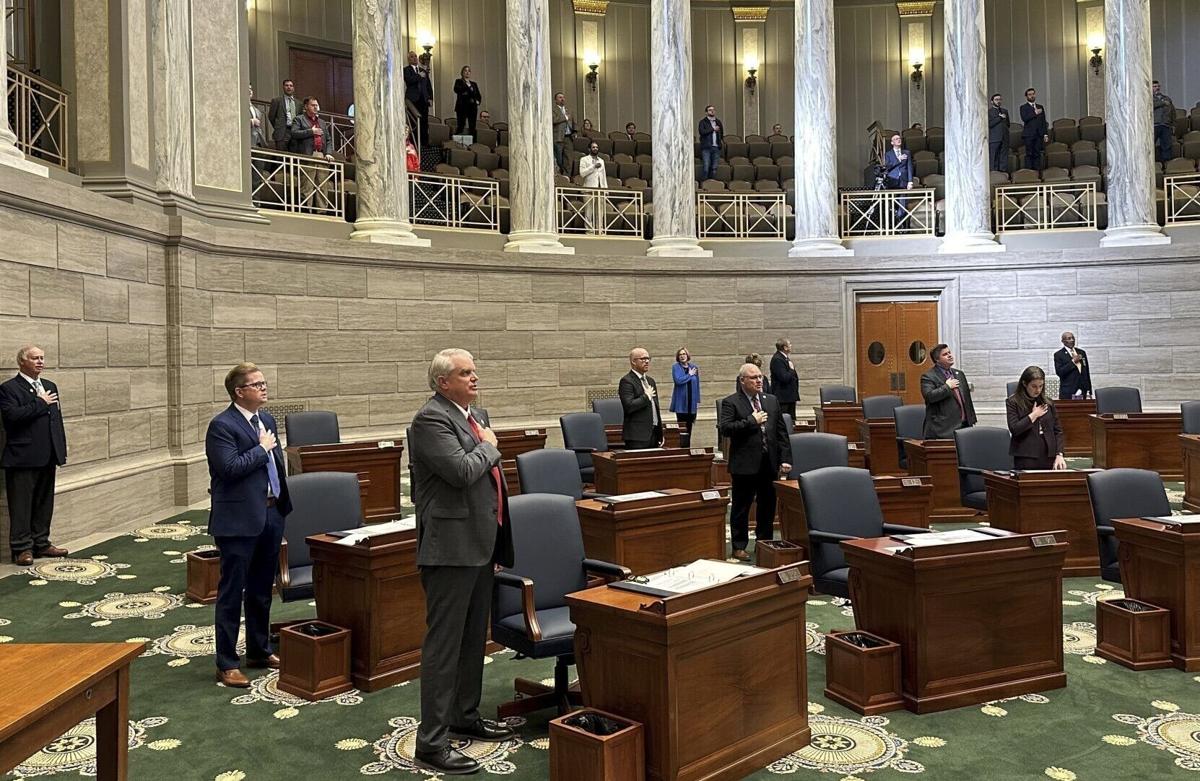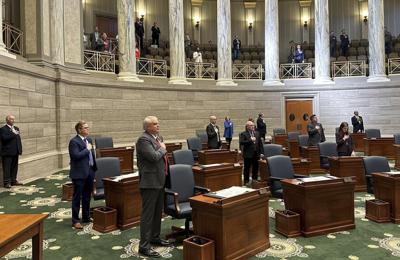JEFFERSON CITY ŌĆö Missouri lawmakers approved a $52 billion budget Friday, setting the stage for one final week of action under the Capitol dome before the House and Senate end their annual legislative session.
But, in piecing the budget puzzle together, House Republicans opted against approving more than $513 million in pet projects, saying the Senate had zeroed out too much House spending in the final version.
The impasse appears to mean millions of dollars in brick-and-mortar spending will go by the wayside when the new fiscal year kicks in July 1.
ŌĆ£IŌĆÖm disappointed weŌĆÖre not getting that done,ŌĆØ said Rep. Betsy Fogle, D-Springfield, who is the ranking minority member of the House Budget Committee.
Up against FridayŌĆÖs 6 p.m. deadline to finish the budget, the House and Senate worked quickly to sign off a plan giving Republican Gov. Mike Kehoe some wins but leaving him with decisions on whether to use his veto pen on other parts of the sprawling package.
People are also reading…
Tops among his victories was a hard-fought agreement to earmark $50 million to expand the stateŌĆÖs private school voucher program, which is currently funded via donations.
But, the first-year chief executive also will face a $300 million increase for school funding over what he had requested, putting the issue in his crosshairs heading into the summer.
Kehoe also will have to determine if the state can afford a cut in the stateŌĆÖs capital gains tax projected to reduce general revenue by more than $400 million in the fiscal year beginning July 1.
With the budget completed, lawmakers have one more week to push their remaining priorities across the finish line, including a bid to try and overturn a new minimum wage and sick leave law and giving voters another chance to weigh in on the legality of abortion in the state.
A proposal to subsidize the conversion of empty downtown ├█č┐┤½├Į office buildings into residential apartments also is in the mix.
The issue of vouchers was the focal point of this yearŌĆÖs spending plan as a bipartisan bloc in the Senate argued taxpayer money shouldnŌĆÖt be used for tuition at private schools.
The four-year-old voucher program currently to qualified students for the current school year.
Using public funds for private religious schools is currently barred by the Missouri Constitution, though the U.S. Supreme Court in 2022 struck down a similar restriction in Maine, placing MissouriŌĆÖs ban in doubt.
As a workaround, supporters say the money will not go directly to private schools because the program will be administered by the state treasurerŌĆÖs office.
Republicans said expanding school choice will give an estimated 7,500 additional students more educational options.
ŌĆ£The systems we currently have in place are broken,ŌĆØ said Rep. Bishop Davidson, R-Republic.
ŌĆ£ItŌĆÖs an exciting time to be in this chamber, giving all the families, regardless of where you live, what you look like, the ability to get your kid a quality education that fits their needs (instead of) the one size fits all model,ŌĆØ said Sen. Nick Schroer, R-Defiance.
Democrats said the move put the state on a ŌĆ£slippery slopeŌĆØ toward the privatization of education.
ŌĆ£ItŌĆÖs a big shift in what weŌĆÖve done in our state,ŌĆØ said Rep. Stephanie Hein, D-Springfield. ŌĆ£I am concerned about the precedent we are setting by funding private schools with taxpayer dollars.ŌĆØ
Sen. Maggie Nurrenbern, D-Kansas City, called the money a ŌĆ£slush fund.ŌĆØ
ŌĆ£There is no oversight. No accountability. And no way for taxpayers to object to what is a historic, and dangerous shift in how Missouri spends its money,ŌĆØ Nurrenbern said.
Currently, about 2,600 students are covered by the program.
The total amount heading to public schools in Missouri tops $8 billion.
ŌĆ£We are providing a record amount of funding for public education,ŌĆØ said House Budget Committee Chairman Dirk Deaton, R-Seneca.
It includes up to 10% pay raises for long-time state employees, a $107 million expansion of child care funding and a 3% increase to the stateŌĆÖs universities and community colleges. All are priorities of the governor.
State park rangers and highway patrol employees also will receive 6.8% pay raises to keep pace with salary rates for public safety personnel in other states.
A Senate change cut 25 positions from Secretary of State Denny HoskinsŌĆÖ budget, which he says could affect future operations. It was inserted by fellow Republicans after Hoskins spent eight years in the Senate advocating for similar headcount reductions in state government.
The package includes $20 million to continue a program put in place by former Gov. Mike Parson to upgrade and maintain MissouriŌĆÖs expansive network of rural roads. Kehoe had sought $60 million.
The largest of the budget bills is a $17 billion outlay for the Department of Social Services, which pays for the stateŌĆÖs Medicaid health insurance system and other benefits for low-income Missourians.
The House decision to forgo the construction spending bill will leave big ticket projects in limbo.
Included in the proposed spending is $20 million to continue a program designed to make railroad crossings safer in the wake of a deadly 2022 Amtrak crash in Mendon, Missouri.
The decisions also scuttle nearly $16 million for renovations at the Jefferson Barracks National Guard center in south ├█č┐┤½├Į County and $9 million for flood plain issues in west suburban Maryland Heights.
The House move also sidelined a $20 million earmark to help Cape Girardeau redevelop the historic Haarig Commercial District.
The legislation is Houscept for House Bill 19.
Missouri's Legislature reflects the federal structure in many ways. Video by Beth O'Malley

















